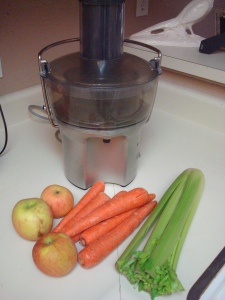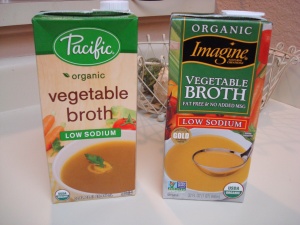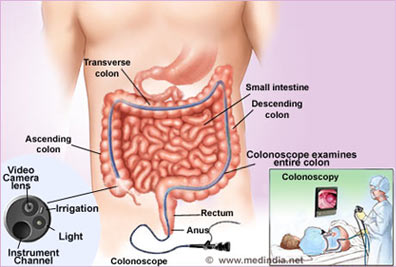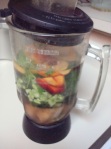Sun.
Breakfast
scrambled eggs and toast
- Lightly whisk the eggs, cream and a pinch of salt together until all the ingredients are just combined and the mixture has one consistency.
- Heat a small non-stick frying pan for a minute or so,
- then add the butter and let it melt. Don’t allow the butter to brown or it will discolour the eggs.
- Pour in the egg mixture and let it sit, without stirring, for 20 seconds. Stir with a wooden spoon, lifting and folding it over from the bottom of the pan. Let it
- sit for another 10 seconds then stir and fold again.
- Repeat until the eggs are softly set and slightly runny in places, then remove from the heat and leave for a few seconds to finish cooking. Give a final stir and serve the velvety scramble without delay.http://www.bbcgoodfood.com/recipes/1720/perfect-scrambled-eggs
Không ăn chất xơ
Không ăn rau
Không ăn trái cây
Lunch
&
Dinner
(as above)
bonus:
SWANSON
100% Natural
Vegetable Broth
Swanson's Vegetable Broth ($2.99)
- Sodium content: 800 milligrams per cup
- Ingredients: Vegetable broth (water, concentrated juices of carrots, celery, tomatoes, celeriac, onion, cabbage), salt, yeast extract, vegetables (carrots, onions, celery), potato flour, dehydrated carrots
- Appearance: Clearest of all the broths
- Aroma: No noticeable vegetable aroma
- Flavor and mouthfeel: Saltiest, sweet, tasted most like chicken broth
Mon.
Breakfast
&
Lunch
(As Sun.)
Thirsty
Drink ~ 5-7 Gastrorade bottles
orange or lemon flavour
or
apple, pear juice
Hungry:
Ăn Bánh mì * Trứng scramble
Dinner: NO
At Night:
7pm
Liquid * 250ml warm water
&
Gastrorade (750ml)
Then
.....
(~5 to 7 times)
***
Tues.
7am
Liquid * 250ml warm water
&
Gastrorade (~2bottles)
or
Apple Cider Vinegar
Then
.....
9am
Stopping eating everthing
12.30 noon
presenting
1:00 pm
Action!
<><><
Consume only clear liquids and foods. This is the only type of liquid or food you can consume the day before your colonoscopy. A liquid is deemed "clear" if you can see through it to read a newspaper. Clear liquids include the following:
- Water
- Apple juice without pulp
- Tea or coffee without milk
- Clear chicken or vegetable broth
- Soda
- Clear sports drinks
- Flavored gelatin
- Popsicles (ca rem cay)
- Hard candy
- Honey
2
Don't consume solids or opaque liquids. Any liquids containing pulp or dairy and almost all solid foods should be avoided. Don't eat or drink the following:
- Orange juice, pineapple juice or any other juice you can't see through
- Dairy products like milk or milk shakes, cheese, etc.
- Smoothies
- Soups with chunks of food
- Grains
- Meat
- Vegetables
- Fruit
3
Have at least 4 glasses of clear liquids for every meal. Breakfast, lunch and dinner the day before the procedure should each be composed of at least 4 8-10 ounce glasses of clear liquids.
- You could have a glass of coffee without milk, a glass of apple juice and two glasses of water for breakfast.
- You could have a glass of sports drink, a glass of clear broth and two glasses of water for lunch.
- You could snack on clear hard candy, popsicles or jello.
- You could have a glass of tea, a glass of vegetable broth and two glasses of water for dinner.
4
Take your prep medication. Your doctor should have given you a prep medication that you should begin taking at 6:00 pm the day before the test. The prep medication will help to clear your colon for the following day. Sometimes doctors prescribe split prep medication, which means that half should be taken in the evening and half the same day of the test. Follow your doctor's instructions and the instructions on the prep medication packaging. After taking the prep, your stool should begin looking like the clear liquids you've been consuming - that's how you know it's working.
- If your stool still looks brown and murky, the prep medication has not yet taken effect.
- If it's tan or orange and clear, it's starting to work.
- Your bowel prep is complete and you're ready to go when your stool looks clear and yellowish, like urine.
Part1
Knowing What to Expect
-
1Understand the purpose of a colonoscopy. Colonoscopy is the best technology available for determining whether cancerous or precancerous growths called polyps are present in the colon. Early detection can enable patients to get the treatment they need to prevent growths from advancing to the next stage. The American Cancer Society recommends that people over age 50 should have a colonoscopy every 10 years.[1] Those who are at increased risk of getting colon cancer should have the test done more frequently. This includes people in the following categories:
- Those with a personal history of colon cancer or polyps.
- Those with a family history of colon cancer.
- Those with a personal history of inflammatory bowel disease (IBS) or Crohn's disease.
- Those with familial adenomatous polyposis (FAP) or hereditary non-polyposis colon cancer (HNPCC).
-
2Get familiar with how the procedure works. The procedure begins with a rectal exam, during which the physician will feel around the anal and rectal area. A long, thin probe called a colonoscope is then inserted into the colon through the anus. The probe has a tiny camera on the end that can provide images of the colon, revealing the presence of polyps or other growths.
- In order to ensure the camera can provide clear images of the colon, it must be empty during the procedure. This means the patient must not eat solid foods the day before and day of the procedure.
- The patient is often given medicine to help them relax during the procedure. Many don't remember the procedure once they wake up. It usually lasts about 30 minutes.[2]
-
3Commit to preparing your body the right way. When you first meet with your doctor to discuss your colonoscopy, you will be given instructions as to how to prepare your body for the test. You'll be told not to eat solid foods and instructed on how much liquid you should drink, and when. Following these instructions is very important to ensure that your colon is clean on the day of the procedure. If it isn't, the camera won't be able to get a clear view of your colon - which might mean you'll have to do it all over again on a different day.
- Even having a snack could end up meaning your test will have to get cancelled. It will be tough to fast the day before the test, but it will definitely pay off in the end when your test is over and done with quickly.
- It might help to prepare yourself a week in advance by eating lightly leading up to the day before the exam.
-
4Check your medication routine. There are certain medications that patients have to stop taking one or more days before the exam. It's very important to be up front with your doctor about what medications you're on before you prepare for the test. In some cases you will need to stay on your medication anyway, but in other cases your doctor might advise you to stop taking them for a few days. Nutritional supplements can also interfere with the test. Talk with your doctor if you're taking any of the following medicines or supplements:
- Anti-inflammatory medication
- Blood thinner medications
- Aspirin
- Diabetes medicine
- Blood pressure medication
- Fish oil supplements
-
5Have a plan in place for test day. Colonoscopies are normally schedule in the morning. Clear your schedule so you have time to prepare for undergo the test. Since your doctor will likely give you medicine to relax you, you may be too drowsy to drive home from the test, so consider asking someone to drive you home. You may want to take the entire day off of work, or at least schedule in an hour or two to rest.
Part2
Preparing the Day Before
-
1Consume only clear liquids and foods. This is the only type of liquid or food you can consume the day before your colonoscopy. A liquid is deemed "clear" if you can see through it to read a newspaper. Clear liquids include the following:
- Water
- Apple juice without pulp
- Tea or coffee without milk
- Clear chicken or vegetable broth
- Soda
- Clear sports drinks
- Flavored gelatin
- Popsicles
- Hard candy
- Honey
-
2Don't consume solids or opaque liquids. Any liquids containing pulp or dairy and almost all solid foods should be avoided. Don't eat or drink the following:
- Orange juice, pineapple juice or any other juice you can't see through
- Dairy products like milk or milk shakes, cheese, etc.
- Smoothies
- Soups with chunks of food
- Grains
- Meat
- Vegetables
- Fruit
-
3Have at least 4 glasses of clear liquids for every meal. Breakfast, lunch and dinner the day before the procedure should each be composed of at least 4 8-10 ounce glasses of clear liquids.
- You could have a glass of coffee without milk, a glass of apple juice and two glasses of water for breakfast.
- You could have a glass of sports drink, a glass of clear broth and two glasses of water for lunch.
- You could snack on clear hard candy, popsicles or jello.
- You could have a glass of tea, a glass of vegetable broth and two glasses of water for dinner.
-
4Take your prep medication. Your doctor should have given you a prep medication that you should begin taking at 6:00 pm the day before the test. The prep medication will help to clear your colon for the following day. Sometimes doctors prescribe split prep medication, which means that half should be taken in the evening and half the same day of the test. Follow your doctor's instructions and the instructions on the prep medication packaging. After taking the prep, your stool should begin looking like the clear liquids you've been consuming - that's how you know it's working.
- If your stool still looks brown and murky, the prep medication has not yet taken effect.
- If it's tan or orange and clear, it's starting to work.
- Your bowel prep is complete and you're ready to go when your stool looks clear and yellowish, like urine.
 Hard Candyhttp://www.wikihow.com/Prepare-for-a-Colonoscopy
Hard Candyhttp://www.wikihow.com/Prepare-for-a-Colonoscopy
- After taking the laxative, your stools will start out solid, but as the time goes on, they’ll get thinner and thinner, becoming totally liquid
- Follow your medical professionals advice. Your doctor may suggest:
- Drink plenty of water with apple cider vinegar prior to your procedure so that you don’t get hydrated.
- Among the medications you’ll be advised to avoid prior to your procedure are blood-thinning medication and iron supplements (including multivitamins containing iron).
Lucozade
Gatorade Lemon&Lime
Powerade Lemon
Colonoscopy Prep Day!
2
Today is the day (most people) dread. I’m prepping for the colonoscopy procedure. I must admit, listening to stories from others and experiencing one myself, I could get all freaked out … but I decided to change my thinking.
The way I choose to experience it, is to think of it as a chance to get rid of any hidden toxins that have been living in my intestines. I will flush the bad stuff out…start with a “clean slate” and add good stuff (healthy greens, and supplements). I’m even considering doing a one day fast, once a month, the day before the new moon. The new moon would symbolically serve as a reminder that there is always a chance for a fresh start.
(11 a.m.) I started juicing veggies. I made a carrot juice mix but I decided against drinking it today, since my written instructions said not to drink anything red or purple. I know carrots are orange but why take the chance messing up the procedure? So I am saving the carrot, celery, apple juice mix for after the colonoscopy. I will bring it along to the hospital. I am aware that fresh juice loses its nutrients the longer I wait to drink it, so I will add some Green Super Food to kick it up a notch.
I did make another juice… using just celery and apples. I’m also drinking spring water and sipping on vegetable broth.
Then I made the magic concoction that will make my colon so pretty, the doctor might take a picture of it to show his students what a healthy colon should look like (I am going to a teaching hospital). It could happen. Anyway… I can dream right?
o
just kidding:)
(1 p.m.) I took out the special bag that I will wear during the cleaning process. I laid out my regular colostomy bag beside the “fecal collector” ( seriously… that’s what it’s called) so you can see how different they are in size. The bag on the bottom is 7 inches. That’s the bag I wear daily. The one on the top is 15 inches. If I didn’t have the fecal collector, I probably would be dealing with an awful mess because my regular bag would have broken (over and over).
(2:30 p.m.) I did some walking around my complex, meditated, watched some funny shows on television (Workaholics …Those idiots are so funny!) And I did some yoga poses. I feel great. My stomach seems to be happier today. Last night it was upset that I didn’t feed it dinner or late snacks. It seems to be cooperating today.
I got this! It’s all about attitude and mine is A-ok!
My stomach starting talking to me around 3 o’clock. “Feed me! Enough with the vegetable broth.” I ignored it and drank another fresh juice.
(6:10 p.m.) Drank my first glass of Miralax and lemonade. It tastes good! I’m using a straw though so the only thing I need to be careful of is “brain freeze.” The mixture has been refrigerated for a few hours already.
(6:55 p.m.) Just drank my third glass… felt some rumbling around my stoma.
(7 p.m.) My brain is telling my colon to use the toilet the old-fashioned way (pre-ostomy). It feels weird. I sat on the toilet… just in case. False alarm.
(7:10 p.m.) Got glass number four down. I’m feeling full. How many glasses do I have to drink???
(7:15 p.m.) I am craving something salty. Pretzels would do the job to offset the super-sweet taste in my mouth.
(7:45 p.m.) Feels like I’m having labor pains. Breathe in. Breathe out. Ok… we have lift off! Glad I have a bigger bag!
(8:10 p.m.) I won’t be drinking lemonade anytime soon. The upside is — I’m not stuck sitting on the toilet. Glass number six is down.
(8:45p.m.) My sinuses seem to be draining and I’m sneezing a lot.
(9:20 p.m.) My output is clear. Success! And it only took six glasses. This time wasn’t nearly as bad as the first time. It is easier with a bag than the normal way. The cramping was minor. I made it through the worst part! I’m ready for tomorrow.
Be well! Inge
Getting Ready For My Colonoscopy
This Thursday morning I go in for a colonoscopy. It’s been a little over three years since my last one, which was done to find out why I was bleeding from my butt. Back then the doctors found cancer in my rectum. (I had a PetScan a few weeks ago that came back clear so I am sure this will be clear too). This screening is just part of my new routine exam. This time will be different though because I now have a colostomy bag. My prepping will be different. The first time I was an inpatient and the bathroom was too far from my bed. I never made it to the toilet in time so I was given diapers to wear. (I understand why babies cry when their diapers are full… it’s uncomfortable to say the least).
I read a lot of comments on the Internet from people who had colonoscopies. I know it isn’t fun but it isn’t that bad. At least this time I will be in my own home and I (hopefully) will have more control.
I’m starting my prep two days early but the only change I’m doing today is changing my diet. I ate my usual breakfast (raw almond butter on sprouted, raisin toast and coffee with soy cream and raw sugar). I’m eating lightly steamed cauliflower and broccoli dipped in hummus for lunch.
I plan to lay low and read, meditate and do gentle yoga stretches… and of course get my walking in.
Tomorrow I will talk about getting my supplies together (along with photos) and my experience with fasting. The last time I fasted was three years ago because doctors wouldn’t let me eat anything until they knew what was wrong with me and they had a solid game-plan.
Be well! Inge
https://rectalcancermyass.wordpress.com/2014/04/page/2/




